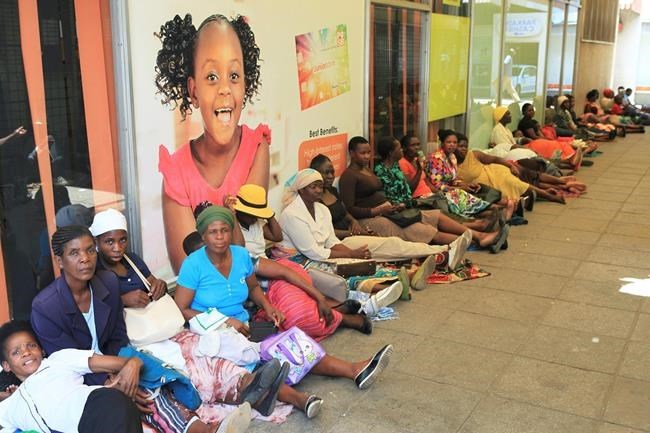
Women wait in a bank queue in a bid to withdraw their money before Zimbabwe introduces a new local currency in this Friday, Oct. 28, 2016 photo. A single $100 trillion dollar note can fetch $5 in cash from street currency traders in this once prosperous Southern African nation where many are desperate for solid financial footing.Now out of circulation, this symbol of Zimbabwe's economic ruin is receiving a warmer embrace than a new local currency the government is introducing this week. (AP Photo/Tsvangirayi Mukwazhi)
November 03, 2016 - 9:08 PM
HARARE, Zimbabwe - Zimbabwe's 100-trillion-dollar bill, a relic of economic ruin, has been an international joke and an online collector's item for years. But this banknote (14 zeros, if anyone is counting) is getting a warmer embrace from Zimbabweans than a new local currency the government is introducing this month.
"I hear people complain about poverty, cash problems and all those things. I am doing pretty well," Willard Mandona, a street currency trader, told The Associated Press. He offers U.S. 10 cents for a $10 trillion note, U.S. 20 cents for a $20 trillion note and $1 for an old $50 trillion note.
"The $100 trillion note is the ultimate prize because I can sell it for $20," Mandona said. The out-of-circulation notes are popular with tourists and are collector's items on eBay, where a $100 trillion note was selling for up to $25 this week.
Few Zimbabweans trust that the new currency, called bond notes, will have a similar worth.
Zimbabwe jettisoned the trillion-dollar notes in 2009 when the government of President Robert Mugabe had printed so much of the currency that hyperinflation reached 500 billion per cent, according to the International Monetary Fund. This once prosperous southern African country then began operating on the U.S. dollar.
Relative stability followed, and inflation was brought under control. Other currencies also became legal tender including the Chinese yuan, the South African rand, the British pound, the Botswana pula, the Euro, the Indian rupee and the Japanese yen. But more than 95 per cent of transactions in Zimbabwe are made with the U.S. dollar, according figures from the central bank, the Reserve Bank of Zimbabwe.
However, the dollar is now in short supply because of low imports, with the trade deficit rising from $400 million in 2005 to $2.5 billion last year. People have money in the banks, but they cannot get cash because the banks do not have adequate U.S. dollar notes. The government has been short of cash and has been late in paying civil servants, teachers, police and army.
The economic frustration fueled widespread anti-government protests this year.
The new local bond notes are to be valued at par with the U.S. dollar to ease bank shortages. They will be anchored by a $200 million U.S. bond facility with Afreximbank. At first, $65 million worth of bond notes will be released, with the balance introduced gradually, according to Reserve Bank governor John Mangudya.
The plan for the new currency has provoked widespread hostility, with street protests against the release of bond notes and court applications from opposition groups to stop it.
Meanwhile, dozens of men and women, some carrying infants, line the streets to buy and sell both U.S. dollars and the old Zimbabwean ones. Some wave placards with their mobile telephone numbers.
The cash shortages will continue because of Zimbabwe's inability to increase exports and its failure to attract meaningful foreign investment, said Harare-based economist John Robertson.
"It's getting worse because people are taking out the few dollars they were keeping in banks," he said.
It is a different story at the banks. Lines that used to snake up to a kilometre (half a mile) long are getting shorter.
"Why should I go to the bank when I know I won't get any money? Cash is now found on the street," said Esther Sandiero, a trader in mobile phones and other electronic gadgets who was trying to withdraw her money in U.S. dollars before banks start issuing the new bond notes.
She was lucky to find her bank allowing withdrawals of up to $200, although the money came in tattered, dirty $1 notes.
"They said they don't have any bigger denominations. It's better than nothing. The other day I was offered coins, can you imagine? Fifty dollars in coins?" she said.
Sandiero voiced the conviction of many that the Mugabe government's introduction of bond notes will introduce a new spiral of inflation: "They will do what they know best: Print more and more until it is worthless."
News from © The Associated Press, 2016